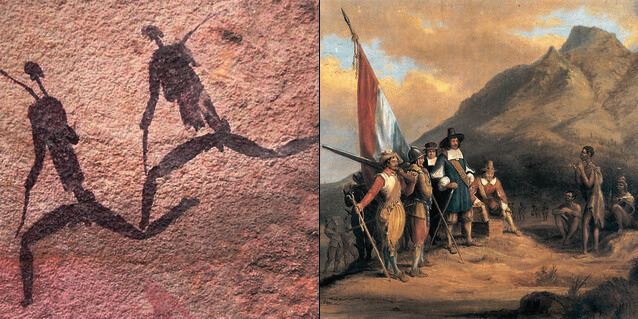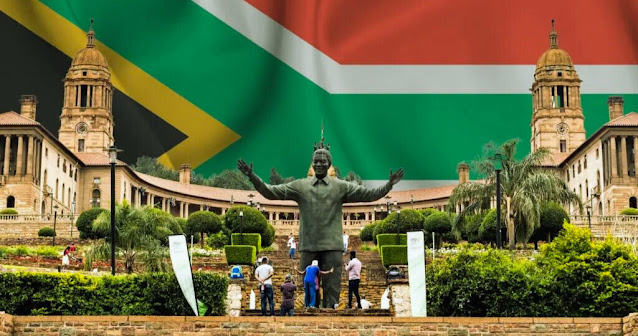History Of South Africa
Prehistory (300,000 BC - 3,000 BC)
Early human ancestors, including Homo erectus and Homo habilis, lived in South Africa during the Paleolithic Era (300,000 BC - 12,000 BC). Stone tools discovered in the area indicate their presence.
During the Middle Stone Age (c. 285,000 BC - 12,000 BC), Homo sapiens first appeared in South Africa. They were hunter-gatherers with sophisticated tools and a complex way of life that included language, trade, and religious practices.
Later Stone Age (c. 12,000 BC - 2,000 BC)
During this time, indigenous San people, also known as Bushmen, thrived. They improved on earlier stone tools and left behind rock art that reflected their nomadic hunter-gatherer lifestyle.
Antiquity (from 3,000 BC to 0 AD)
Iron Age (c. 300 BC - 500 AD): Bantu-speaking communities migrated from West Africa to the continent's southernmost regions, including South Africa. They brought iron smelting technology, agriculture, and new social structures, and they displaced some indigenous San and Khoikhoi peoples.
Middle Ages (0 AD - 1,500 AD)
Bantu Expansion (0 AD - 1,500 AD): Bantu-speaking peoples spread throughout South Africa, establishing complex societies and kingdoms. During this time, notable kingdoms included Mapungubwe, Great Zimbabwe, and the Kingdom of Mutapa.
European Contacts: In the late 15th century, Portuguese explorers, including Bartolomeu Dias, landed on the South African coast, kicking off European exploration and trade in the region.
Read Also Why South Africa Uses "ZA" Instead of "SA" in Internet Domain
Recent History (1,500 AD - Present)
- Bantu countries (16th-19th centuries): Zulu, Xhosa, Bapedi, Batswana, South Ndebele, Basotho, Venda, Tsonga, and Swazi are among the Bantu-speaking cultures and identities that have emerged. Each culture developed its own system of governance, customs, religion, and ethics.
- European Colonization (the 17th and 18th centuries): In 1652, the Dutch East India Company opened a refreshment station in Cape Town, paving the way for European settlement in South Africa. The Cape Colony was an important strategic port.
- British Rule in the nineteenth century: In 1806 the British took control of the Cape Colony. The Anglo-Zulu War and the Anglo-Boer Wars resulted from conflicts between the British, Boers (Dutch-descended settlers), and indigenous peoples.
- South African Union (1910): The Union of South Africa, a self-governing dominion within the British Empire, was formed by the union of the four British colonies and the Boer republics.
- Apartheid Era (1948-1994): Apartheid, a system of racial segregation and discrimination, was implemented by the National Party. Protests and international sanctions erupted, eventually leading to the end of apartheid.
- End of Apartheid and Democratic Transition (1990-1994): In 1994, President F.W. de Klerk initiated negotiations to end apartheid, freed Nelson Mandela, and held multi-racial elections. Mandela became South Africa's first black president.
- Post-Apartheid South Africa: Significant social, political, and economic changes have occurred in the country, including the establishment of the Truth and Reconciliation Commission, constitutional reforms, and efforts to address economic and social challenges.
Since the end of apartheid, South Africa's history has been unfolding, with ongoing efforts to achieve social justice, economic development, and political stability while addressing the country's complex past and diverse society.
FAQ
1. What is the history of South Africa in 1652?
The Dutch East India Company established a refreshment station at Cape of Good Hope in 1652, which would later grow into Cape Colony, in South African history. This marked the start of European settlement in the area.
2. Where do Zulu originally come from?
The Zulus originated in the southeastern region of Africa, specifically in what is now known as South Africa's KwaZulu-Natal province. They are members of the Nguni-speaking ethnic group.
3. What is the oldest tribe in South Africa?
Because the region has been inhabited by various indigenous groups for thousands of years, determining the absolute oldest tribe in South Africa is difficult. However, the San (also known as Bushmen) is considered one of South Africa's oldest continuous cultures, with a history dating back thousands of years.
4. Where does Sotho originally come from?
The Sotho people are originally from South Africa's northeastern region, Lesotho, and parts of Botswana. They are part of the larger Southern Bantu ethnic group, which is made up of various subgroups such as the Basotho and the South Sotho.
5. Who is the first tribe on earth?
Because human history spans hundreds of thousands of years and is marked by the development and movement of various groups and cultures, it is impossible to identify a single "first tribe" on Earth. As societies became more complex, the concept of tribes evolved as well. Indigenous groups from various parts of the world have distinct histories and cultural practices.


